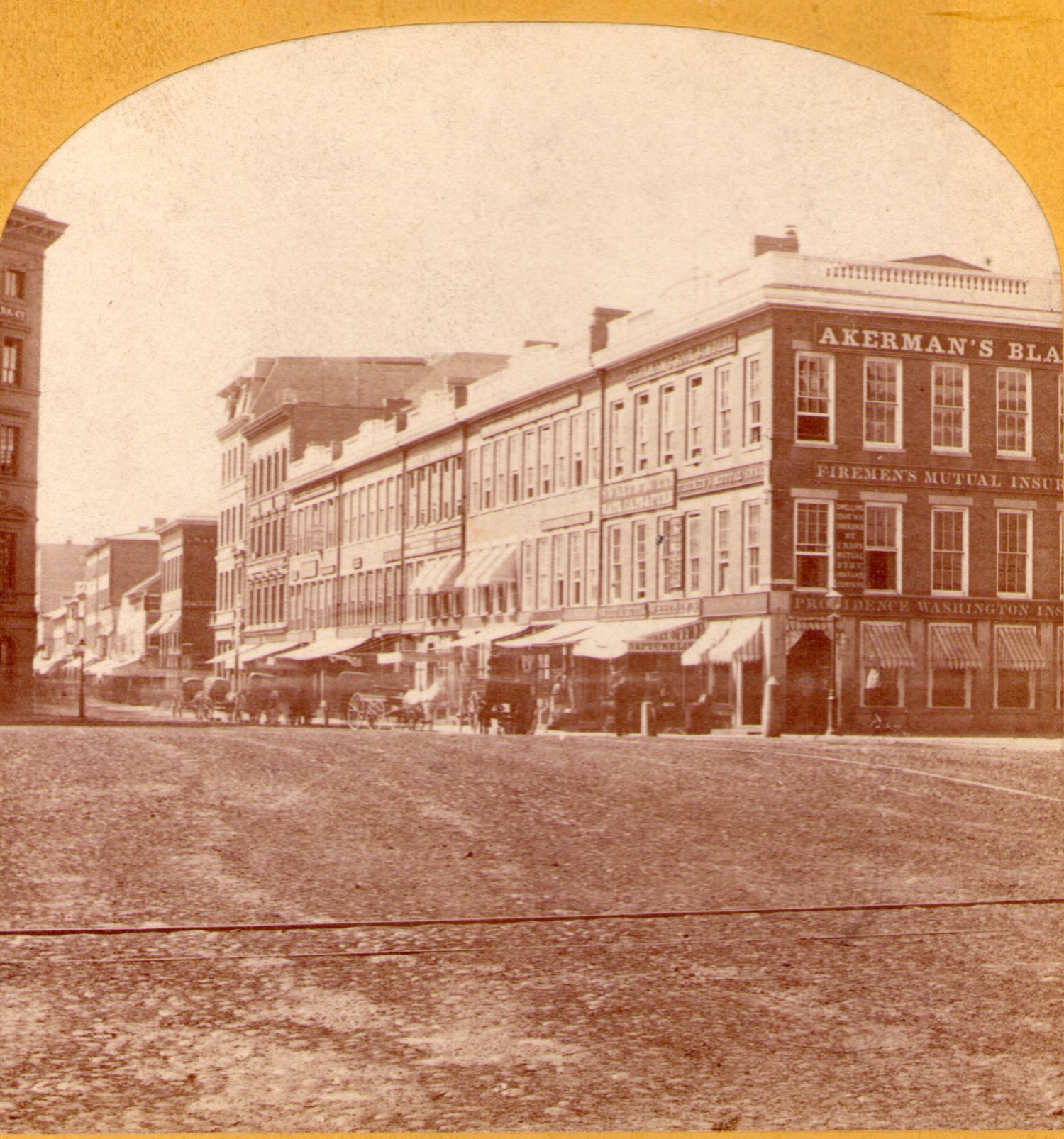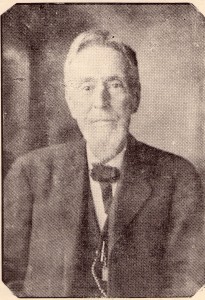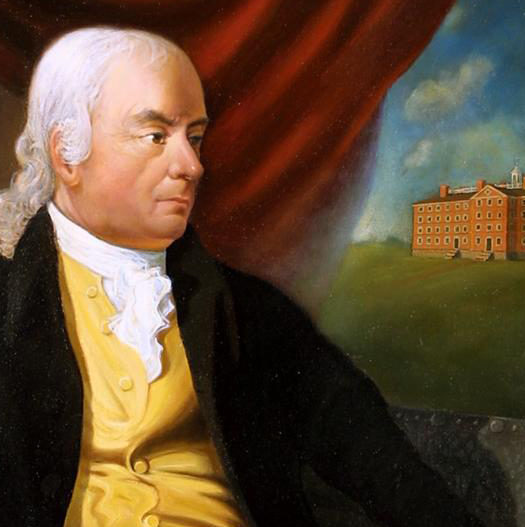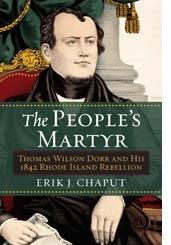More than any other Rhode Islander of his generation, Sidney S. Rider was in the business of history. Rider was the premier bookseller in Rhode Island in the later part of the 19th and early 20th centuries. He was also a learned chronicler of Providence’s early history. In 1878, Horatio Rogers, president of the Rhode Island Historical Society, wrote a small book on the private libraries of Providence, dedicating an entire chapter to Rider’s collection. The purpose of Rider’s library, according to Rogers, was “to illustrate the rise and progress of ideas, the current of thought, the development of the material industries, and the political history of the State, from the earliest times to our own day.” [1]
For those who have set out to write about Rhode Island’s rich history, Rider is a familiar name. The size of the “Sidney Rider Collection” at Brown University’s John Hay Library is extensive, often overwhelming to those who set out to sift through it. Researchers will encounter more than 15,000 items including books, pamphlets, manuscripts, and newspaper clippings chronicling the founding of the colony in 1636 to the post-Civil War era. However, while researchers may spend months with this material, most know nothing about the man who assembled it. [2]
Originally from Rensselaer County, New York, the Rider family relocated to Providence in 1845. At the age of 12, Sidney Rider worked as an apprentice in Charles Burnett’s bookshop in Market Square, then the leading one in the city. In 1859, the 26-year-old Rider went into partnership with Henry Stewart selling new, old and rare books, as well as stationary at a Westminster Street shop. This venture was initially named Stewart and Rider, but by December 1859 Rider was the sole proprietor. [3] In 1890, the bookstore was moved to Snow Street where it remained until it closed at the turn of the century.
Since competition for customers was keen among Providence’s booksellers, the ever enterprising Rider quickly diversified his business. In 1867, Rider issued The Bibliomaniac, a monthly periodical devoted to literary interests and fine arts. Though this periodical had a short run of just three issues, it set the stage for the similarly formatted Literary News, which first appeared in September 1879. In 1883, the first issue of Book Notes was distributed to subscribers. With 870 issues spanning 33 years, this informative series constitutes Rider’s greatest contribution to the study of Rhode Island history. Nearly a century after the first issue was sent out to subscribers, Book Notes remains a valuable resource for scholars. Its pages are crammed with short articles on a variety of topics containing arcane information that would otherwise be lost to modern researchers. [4]
Rider’s penchant for muckraking journalism was often on full displayin Book Notes. “He who lacks the courage to utter an opinion is … a more unworthy member of the body politic than he who proverbially has no opinion,” maintained Rider. [5] The Union Railroad Company often came in for a goodly share of his wrath. In 1892, Rider noted that the “abominable stealing of the public highways, for the enrichment of the stockholders of the Union Railroad Company, done under the forms of law, deserves the execrations of all decent men, not only upon those men who projected, but also upon those who, although sworn to defend the public interest, have bartered them away. It is literally, highway robbery.” [6] Rider’s concern was that public property was being manipulated and controlled by private enterprise. He insinuated that public officials had taken bribes in the form of free tickets to ride the railroad. Rider suggested that William Vaughan, chairman of the City Council’s committee on terminal facilities, ought to be hung: “Talk is cheap; action only is effective. Use hemp. Hang Mr. Vaughan and his committee.” [7]
At the same time Rider was attacking the rampant political corruption in the state, he was also conducting research and accumulating material on the history of Rhode Island’s constitutional development. One of the most detailed repositories of the state’s constitutional history was the vast correspondence of Providence reformer Thomas Wilson Dorr. Upon Dorr’s death in 1854, his papers passed into the hands of his most trusted advisor, Providence attorney Walter S. Burges. [8] Rider noted in an August 1880 memorandum that he received Dorr’s papers on loan from Burges, who was then serving as a member of the Rhode Island Supreme Court.
Seven years went by, however, before Rider produced a prospectus. As he stated in a note to Burges about the delay, his goal was “to make some arrangement to publish” his book in a manner that would not “bankrupt” him. [9] At the end of the 1890s, with Burges now deceased, Burges’s daughter tried in vain to get Rider to return Dorr’s papers to her family. In 1903, Marsden J. Perry, a wealthy financer who amassed a fortune in the utilities industry, and a frequent target of Rider in Book Notes, purchased Rider’s collection and quickly deeded it over to Brown University. Perry, who was known as the “Utility King,” frequently used his vast wealth to purchase priceless collections. [10] His Shakespeare collection was considered at the time to be one of the largest in the world.
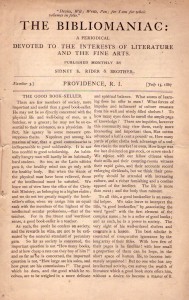
The Bibliomaniac, a monthly periodical devoted to literature and the fine arts, only had a run of three months. (Russell DeSimone Collection)
Rider’s most significant work, The Development of Constitutional Government in Rhode Island was to be published in three volumes. Rider published a subscription form in his Book Notes with a goal of attracting subscribers at $5 per volume. [11] Rider’s work, unfortunately, never saw the light of day. By the time Rider advertised for subscribers in 1911, he was an elderly man and may have lost some of his drive. Today Rider’s unfinished manuscript resides at the Rhode Island Historical Society Library in 27 large scrapbook volumes.
As the First World War raged in Europe, Sidney Rider died in Providence on January 31, 1917 at the age of 84. Annie and Burnett Rider buried their father next to their mother, Loraina, in Providence’s North Burial Ground. In a tribute to his career as bookseller, collector and historian, the Providence Evening Tribune declared that “No man who has known Sidney Rider need say a gloomy farewell. He will live, a bright and cheering figure, in the mind and memory as long as mind and memory persist.” [12] Students of the state’s history will forever be in his debt. In 2007, Rider was inducted into the Rhode Island Heritage Hall of Fame.
[Banner Image: Market Street (later renamed Westminster Street) in Providence in the late 19th century. Rider’s bookshop was under one of the awnings. (Russell DeSimone Collection)][1] Horatio Rogers, Private Libraries of Providence (Providence: Sidney S. Rider, 1878). [2] Large portions of the material relating to the history of Rhode Island in the John Hay Library at Brown University are cataloged as the “Sidney S. Rider Collection.” About a quarter of the collection is devoted to the correspondence of the prominent nineteenth century reformer Thomas Wilson Dorr (1805-1854) and the rebellion he led against the Rhode Island state government in 1842. The Rider collection was used extensively for the Dorr Letter Project, a scholarly project devoted to the correspondence of Thomas Wilson Dorr, and hosted by Providence College at: http://library.providence.edu/dps/projects/dorr/letters.php. [3] H. Glenn Brown and Maude O. Brown, A Directory of Printing Publishing, Bookselling & Allied Trades in Rhode Island to 1865 (New York Public Library, 1958). [4] As a case in point, several years ago an antiquarian bookseller inquired of one of the co-authors information on the authorship of the fairly obscure pamphlet Robert the Hermit published in Providence in 1829. While no bibliography provided any such detail, Rider’s Book Notes for September 22, 1883 contained the required information. [5] Book Notes, vol. 4 (1886-7), 105. [6] Book Notes, vol. 9 (1892), 122. [7]“Afraid of Rider,” Providence Evening Telegram, 1Sept. 1893, p. 1. [8] Walter Burges (1808–1892) served as state Attorney General from 1851 to 1863 and Associate Justice on the Rhode Island Supreme Court from 1868 to 1881. [9] Sidney Rider to Walter Burges, Apr. 3, 1887. Thomas Wilson Dorr Papers (Box 1 Folder 24). John Hay Library. [10] Patrick T. Conley and Paul Campbell, Providence: A Pictorial History (Norfolk, VA: The Conning Co., 1982), 100 and 118. See also Scott Molloy, Trolley Wars: Streetcar Workers on the Line (Lebanon, NH: University of New Hampshire Press, 1996), 67. [11] Book Notes, vol. 28 (1911), 208. [12] Book Notes, vol. 18 (1901), 137.

